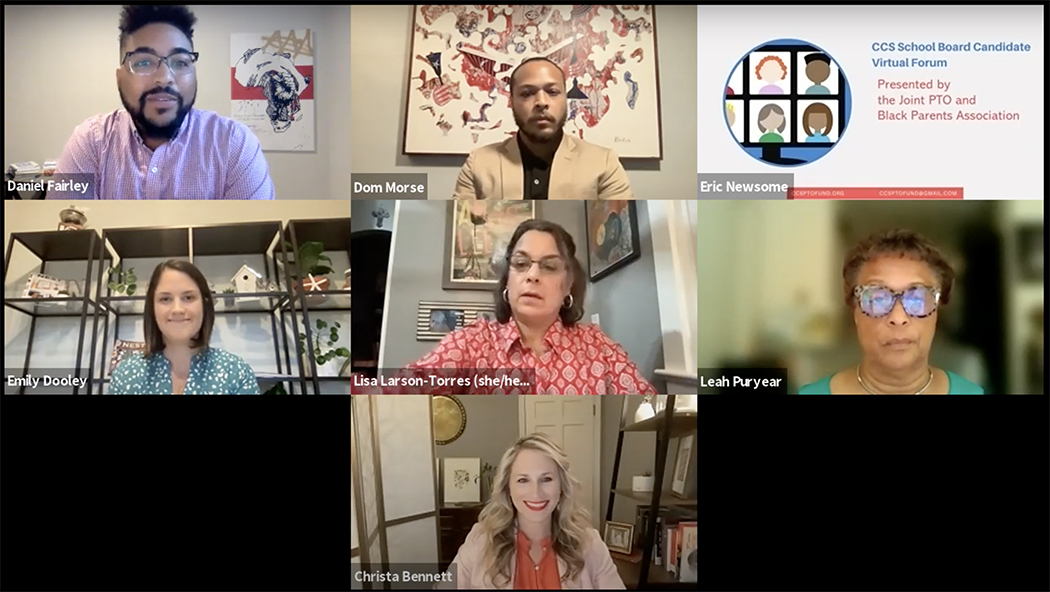In addition to electing a new governor and several other local and state leaders, Charlottesville residents will vote for city school board members on November 2. Five candidates are competing for three spots: Strive for College CEO Christa Bennett, real estate agent Emily Dooley, Albemarle County youth entrepreneurship facilitator Dom Morse, school board chairwoman and physical therapist Lisa Larson-Torres, and longtime board member Leah Puryear.
In a virtual forum hosted by the Black Parents Association and the CCS Joint PTO last week, the candidates detailed how they would address critical issues affecting the school district, including racial equity, COVID recovery, school reconfiguration, teacher retention, and staff shortages. Daniel Fairley, the city’s youth opportunity coordinator, moderated the event.
Bennett explained her plans to hold biweekly listening sessions in downtown Charlottesville, allowing community members to easily express their concerns and ask questions outside of school board meetings.
“It’s important to check in with people of color on how they view equity, and what we can do to get there,” she said.
Dooley, who was a teacher and principal for 10 years in central Virginia, said the school district needs to focus less on standardized testing that is “in and of itself rooted in racial inequities,” and more on guaranteeing all students have access to “high level instruction” that teaches critical thinking and problem-solving skills.
Larson-Torres and Puryear pointed to the equity work they have championed since joining the school board, including developing a three-year-old program, creating an equity and anti-bullying policy, and hiring the district’s first supervisor of equity and inclusion.
To Morse, CCS could do more to implement equity and social-emotional learning into its learning models. “That looks like supporting our teachers to help them design a curriculum that allows our students to explore their own interests [and] identity,” he said.
Despite the numerous challenges faced during the pandemic, the school district was able to provide laptops and resources to all students, and maintain high graduation rates, said Puryear.
But as schools continue to recover from the pandemic, the district must address learning loss, said Bennett. From her research on what other schools are doing to help struggling students, she learned that high-dosage tutoring—during which a teacher works one-on-one with a student, or a very small group of students, for 30 to 60 minutes—has been “one of the most effective tools.”
Discussing the district’s substitute teacher and bus driver shortage, Bennett suggested the board create a program allowing substitute teachers to receive full-time pay and benefits and commit to working at one school for a year. Dooley also recommended the district expand public transit options for older students, and improve walkability and bikeability to all schools.
“We have to think about ways we provide development for [bus drivers] so it’s an easier position, but also think about how we complete their day,” said Morse. “Can we find ways to tie them into our school district even farther, whether it’s as instructional assistants or maybe they work in the cafeteria as well?”
To retain teachers, all five candidates emphasized the importance of paying them fairly, as well as providing them with support systems and listening to their concerns.
“We need to not make [teachers] feel like they have to be a martyr to their job,” said Dooley. “Teachers being given superficial involvement, or being brought to conversations late in the game has been an ongoing issue, [as well as] teachers being pitted against parents or the community.”
Dooley and Bennett also expressed their support for a collective bargaining ordinance, which would allow city employees—including teachers—to form unions and negotiate their contracts.
Puryear explained that she has worked to increase teachers’ salaries every year since being elected to the school board in 2006, and supported raises for frontline workers during the pandemic. The board is currently working with CCS Superintendent Royal Gurley to better compensate substitute teachers, added Larson-Torres.
When putting together the school district’s next budget, Bennett and Dooley said they would audit current programs and examine data. Morse added that he would prioritize funding for student-facing positions.
This month, Charlottesville City Council unanimously approved the school board’s plan to renovate Walker Upper Elementary School and Buford Middle School. To pay for the $100 million reconfiguration, Bennett—who led the effort to build a playground at Walker Upper Elementary School—said she would draw upon her community organizing experience to advocate for increasing the city’s real estate and sales tax. The incumbents explained that they have already begun searching for funding and reaching out to legislators, and may collaborate with philanthropists on the expensive project.
Before closing out the forum, each candidate pitched why they were the best person for the job.
Bennett stressed that she is the only candidate who currently has a child in the city school system, while Dooley emphasized her years of experience in education. Morse, who was born and raised in Charlottesville, explained that he has lived through many of the disparities they just discussed.
Puryear, whose children graduated from city schools, described her passion for advocating for children, pointing to the nearly four decades she has spent directing UVA’s Upward Bound program. Larson-Torres detailed her personal experience fighting for special accommodations for her daughter at school, which spurred her to run for the board in 2017.
“Every decision I’ve made has been student and equity focused,” ended Larson-Torres. “I will still keep on showing up.”
